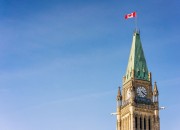If you have lived in Alberta and worked on environmental issues as long as I have, you get pretty used to being asked, "Man-made climate change is not real — how can you still believe in it?" Because that myth seems to be getting so much traction lately — and because of what's at stake if those who spread misinformation about climate change convince our governments that inaction and indifference are acceptable — I want to share how I approach such conversations.
I always start by asking skeptics this simple question: "What part of the evidence of climate change do you not believe?" They usually answer by repeating some recent statement they read or heard from a "credible" scientist that said something along the lines of "global warming comes from sunspots," or "the planet's getting cooler not warmer," or "we have had much higher CO2 concentrations in the past" — the list goes on.
 WATCH VIDEO: Top climate change policy advocates and skeptics faced off in Toronto for the Munk Debate on Climate Change, Dec. 1, 2009It's tempting to counter such arguments with real facts, such as: overwhelming evidence shows that our CO2 emissions are altering the climate balance more than sunspots, while NASA reports that we're currently experiencing "the deepest solar minimum in nearly a century"; 2009 was tied as the second-warmest year in the historical record (behind 2005) and the 2000s ranked as the warmest decade on record; the last time we had CO2 concentrations at 1000 parts per million (ppm) it took 10 million years for them to decline, we are moving toward reaching 1000 ppm within 100 years (that's 100,000 thousand times faster than before, and would result in 6°C of warming).... I could go on, but this approach almost always fails, since the goal of most outspoken climate change deniers is to sell doubt — and it's an easy sell. (Who wouldn't want to believe that climate change is not as serious a problem as the world's best scientists say it is? But more on that in a minute.)
WATCH VIDEO: Top climate change policy advocates and skeptics faced off in Toronto for the Munk Debate on Climate Change, Dec. 1, 2009It's tempting to counter such arguments with real facts, such as: overwhelming evidence shows that our CO2 emissions are altering the climate balance more than sunspots, while NASA reports that we're currently experiencing "the deepest solar minimum in nearly a century"; 2009 was tied as the second-warmest year in the historical record (behind 2005) and the 2000s ranked as the warmest decade on record; the last time we had CO2 concentrations at 1000 parts per million (ppm) it took 10 million years for them to decline, we are moving toward reaching 1000 ppm within 100 years (that's 100,000 thousand times faster than before, and would result in 6°C of warming).... I could go on, but this approach almost always fails, since the goal of most outspoken climate change deniers is to sell doubt — and it's an easy sell. (Who wouldn't want to believe that climate change is not as serious a problem as the world's best scientists say it is? But more on that in a minute.)
Instead, I tend to say that I am not interested in getting into a debate about the detailed science: "Let's face it, neither of us are climate scientists who spend day and night researching this, so it is probably not useful to pretend we can debate the science." Usually this disarms the conversation and creates an opening to actually have a meaningful discussion about the role of science in our decision-making.
I am always curious about what science people trust and how they see it impacting their lives. This has become an even more critical issue as the integrity of climate scientists everywhere has come under fire following the correction of a few minor errors made by some high-profile climate scientists. (On that point, I would challenge anyone to show me scientists in any discipline who haven't corrected minor miscalculations or errors as better, more accurate data becomes available.)
At this stage in the conversation, I usually say: "Everyone has to decide how much scientific findings contribute to their individual choices. And for every issue — let it be H1N1, the risk of cell phones, or climate change — we need to decide which scientists and scientific bodies we trust, since we can't all be scientific experts on all things all the time. So when it comes to climate change, what scientists do you trust?"
More often than not, I get a blank stare at this point. People rarely think carefully about the credentials of the scientists they are listening to — yet often, the "trusted sources" of skeptics are simply feeding them misinformation or doubt about climate change, rather than presenting well-reasoned, substantial critiques of the science based on genuinely peer reviewed and credible evidence.
Skeptical Science is a new application that provides iPhone users with simple responses to climate change skeptics' top arguments.
But when the world's most credible and respected climate scientists have made unequivocal statements about the rate at which climate change is occurring and the need for urgent action, clinging to the position that climate change is a hoax requires believing that all of the world's top climate scientists and many of the world's most influential governments are implicated in a massive conspiracy against the truth.
Now that theory seems a little far-fetched.
Finally, considering climate change in the context of risk management is also important. I often say: "Okay let's talk about risk. If I am wrong, then the worst outcome is we spent a bit of money to build a more efficient economy, to design better cities, to advance renewable energy sources, to protect forest habitats and rare natural resources — and in doing so, we also made our air cleaner and ultimately raised our quality of life. However, if you are wrong and we do nothing — what is the scale of impact we leave for our kids and grandkids?" I find this often helps identify the skeptics' concerns about taking action. In Alberta, the most frequent example raised is carbon capture and storage (CCS) where $2 billion of taxpayer money has been committed. This provides an opportunity to agree with them, as I state — "Yes, I too have concerns with how that money was spent. I do think CCS needs to be part of the portfolio of solutions, but that money could have been much better spent on energy efficiency or renewable energy." More often than not they agree, we politely exchange "nice discussing this with you" and we go on our way.
Of course, some of the most vocal skeptics simply want to maintain their point of view and cast doubt on the facts — even though they can point to no credible, peer reviewed research that supports their position.
That's when I say: "Imagine we aren't talking about climate change. If all of a sudden, on our Blackberrys and iPhones and on the front page of tomorrow's paper we read the headline: Asteroid On Track to Destroy Earth by 2050 — how would we respond?"
No, this is not a flashback to one of the best Atari games of the 1980s. Let me explain:
NASA predicts that an impact with an asteroid 500 km across (as depicted in this artist's rendering) would effectively sterilize the planet. Photo: Courtesy NASA
I personally would look to NASA, the National Science Academies and the Pentagon to confirm the risk. And if they provided us with solutions to deal with this threat, I would support them — even if it did cost money. The funny thing is, these are the bodies that are warning us about the threat of climate change — they have indicated humans are a significant part of the problem, and are providing real, tangible solutions that can prevent the worst of the impacts if we act now.
We have a choice to make.
Other Resources:
- Coby Beck’s How to talk to Global Warming Skeptic
- New Scientist: Climate Change: A guide for the perplexed
- RealClimate: Response to common contrarian arguments
- NERC (UK): Climate change debate summary
- UK Met Office: Climate Change Myths
- Brian Angliss A Thorough Debunking
- John Cross Skeptical Science
- The Global Warming Debate
(List courtesy of RealClimate.org)
NOTE: Pembina's regular review of the week's top climate news will be back next week.






